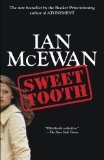Summary | Excerpt | Reading Guide | Reviews | Beyond the Book | Readalikes | Genres & Themes | Author Bio

A Novel
by Ian McEwan
During the meal they avoid talk of the ill-feeling that has stifled their marriage for months. They don't even talk about the children as they so often do. Instead they talk about successful family holidays in the past, and holidays they will take with the children when Jake is a little older. It is all false, none of it will ever happen. Then they talked politics, of strikes and the state of emergency and the sense of impending ruin in Parliament, in cities, in the country's sense of itself—they talked of all the ruin but their own. He watches her closely as she talks, and knows that every word is a lie. Doesn't she think it extraordinary, as he does, that after all this silence they are behaving as though nothing has happened? She is counting on sex to put everything right. He wants her all the more. And more again when she asks in passing about the insurance claim and expresses concern. Amazing. What an actress. It was as if she was alone and he was watching her through a peephole. He has no intention of confronting her. If he did, they would surely row, because she would deny everything. Or she would tell him that her financial dependence forced her to desperate measures. And he would have to point out that all their accounts are jointly held and that he has as little money as she does. But this way they will make love and he at least will know that it is for the very last time. He would make love to a liar and a thief, to a woman he would never know. And she in turn would convince herself that she was making love to a liar and a thief. And doing so in the spirit of forgiveness.
In my opinion Tom Haley spent too long over this farewell chicken dinner, and it seemed especially drawn out on a second reading. It wasn't necessary to mention the vegetables, or to tell us that the wine was a Burgundy. My train was approaching Clapham Junction as I turned the pages to locate the finale. I was tempted to skip it altogether. I made no claims to sophistication—I was a simple sort of reader, temperamentally bound to consider Sebastian as Tom's double, the bearer of his sexual prowess, the receptacle of his sexual anxieties. I became uneasy whenever one of his male characters became intimate with a woman, with another woman. But I was curious too, I had to watch. If Monica was daffy as well as deceitful (what was this angelology business?) then there was something obtuse and dark in Sebastian. His decision not to confront his wife about her deception may have been a cruel exercise of power for sexual ends, or a simple matter of cowardice, of an essentially English preference to avoid a scene. It didn't reflect well on Tom.
Over the years, uxorious repetition has streamlined the process and they are swiftly naked and embracing on the bed. They have been married long enough to be thorough experts on each other's needs, and the ending of long weeks of froideur and abstinence surely contributes a certain bonus, but it can't explain away the passion that overwhelms them now. Their customary, companionable rhythms were violently discarded. They are hungry, ferocious, extravagant and loud. At one point little Naomi in the next room let out a cry in her sleep, a pure silvery rising wail in the dark that they mistook at first for a cat. The couple freeze and wait for her to settle.
And then came the final lines of "Pawnography," with the characters perched uneasily on ecstasy's summit. The desolation was to follow, off the page. The reader was spared the worst.
The sound was so icy and bleak that he imagined his daughter had seen in her dreams the unavoidable future, all the sorrow and confusion to come, and he felt himself shrink in horror. But the moment passed, and soon Sebastian and Monica sank again, or they rose, for there seemed to be no physical dimensions in the space they swam or tumbled through, only sensation, only pleasure so focused, so pointed it was a reminder of pain.
Excerpted from Sweet Tooth by Ian McEwan. Copyright © 2012 by Ian McEwan. Excerpted by permission of Nan A. Talese. All rights reserved. No part of this excerpt may be reproduced or reprinted without permission in writing from the publisher.
Wisdom is the reward you get for a lifetime of listening when you'd rather have been talking
Click Here to find out who said this, as well as discovering other famous literary quotes!
Your guide toexceptional books
BookBrowse seeks out and recommends the best in contemporary fiction and nonfiction—books that not only engage and entertain but also deepen our understanding of ourselves and the world around us.